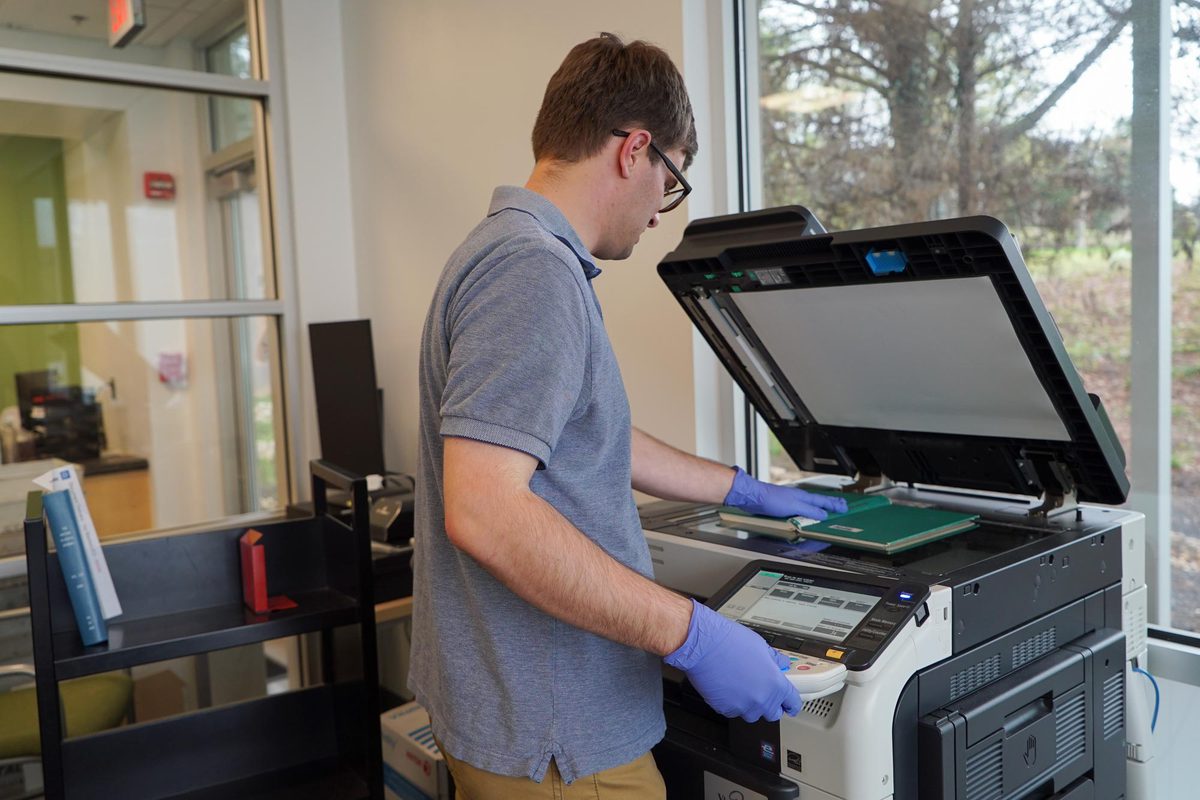A university’s library nourishes the whole academic enterprise. When University of Virginia President Jim Ryan announced that the rest of the spring semester’s courses would be moved online, the UVA Library swung into action to scale up its services, to help in unexpected ways and to continue operating even after the doors officially closed March 16.
Providing digital versions of books and other materials for online teaching and learning – the top priority – required a massive effort.
At the same time, library staffers were schooling faculty members in using Zoom, figuring out how to make UVA’s holdings accessible online, creating online presentations, and finding ways to donate or produce supplies for the medical community.
Their efforts show a collaborative spirit – even from a distance.
The Great Scan-a-Thon
Renee Reighart, who heads Access Services, said the emergency prompted the library to expand its typical instructional scanning services. “Members of the Library Express On-Grounds (LEO) unit were joined by members of Interlibrary Loan, Ivy Stacks, Public Services, Resource Acquisition and Description, and the Digital Production Group to support this work,” she wrote in an email.
They scanned books all day, every day over about three weeks, Reighart said. “Everyone was sprinting as fast as we could.”
Updating the number of scanned pages as of April 10, Reighart said library workers scanned 68,885 PDF pages for a total of 125,000 book pages. For comparison, during the same period last year, they scanned 5,000 book pages, she said. (For many texts, one PDF page equals two pages of a book.) The Special Collections Library also scanned 2,681 pages of rare materials for online course support.
Reighart said, “22,000 of the 125,000 pages scanned were requested by professors and instructors for their newly online courses.” Most were texts for the humanities, especially English, history and politics.
The library employees uploaded the documents to the library’s server, and instructors then had a certain amount of time to retrieve them for their Collab or Canvas learning management systems. The professional schools – Darden, Law and Medicine – made separate but similar efforts.
According to Dean of Libraries John Unsworth, the library has now temporarily suspended this scanning service: “Having filled instructional scanning requests for the current semester, and with COVID cases increasing in the local area, it makes sense for these library staff to stay at home now, for their own good and for the good of the community.”
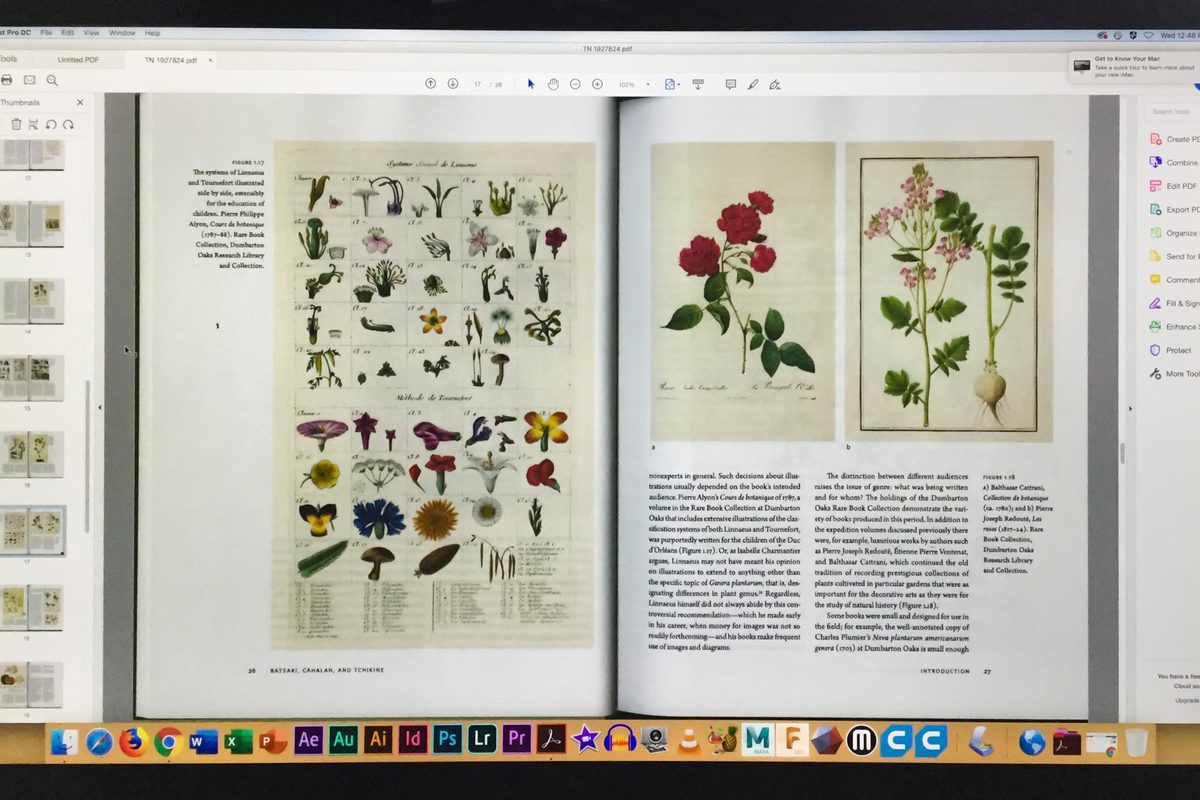
Public Services Manager April Baker scanned art books like this one from the Fine Arts Library. (Photo courtesy of University Library)
With the scan-a-thon behind them, library staffers then shifted their attention to helping with scholarly research, with Chris Ruotolo and her team of subject librarians helping faculty and graduate students, and adding undergraduate researchers later. The subject librarians have also reached out to the 450 or so instructors of summer session courses, most of which will also be online, to help them avoid reliance on the print collections.
The library also purchased licenses for 250 books requested by UVA faculty and graduate students, said Reighart, whose department also includes interlibrary loan and LEO. Some interlibrary loan requests are still being filled electronically.
How to Get Library Materials Now
Resources are available to access more books and other materials. Recently, more than half of the library’s print collection became available online through the digital library HathiTrust, a large-scale, nonprofit collaborative partnership with academic and research libraries that includes content digitized through Google Books, other archives and content digitized locally by libraries like UVA’s.
Calling it “emergency temporary access service,” HathiTrust opened up the digital library to copyrighted books owned by member institutions at the end of March. Members of the UVA community can get access for online reading of books UVA owns for a limited amount of time, but can’t download them.
The library has created a special webpage where it posts updates and FAQ about services for accessing HathiTrust and other resources. There, users also can find assistance from library liaisons and experts who specialize in specific subjects. In addition, there are hundreds of databases on a range of specific topics, as well as “open education resources” for students and faculty that are free to use, adapt and share.
Preservation Services Donated Protective Equipment
Early on, as the pandemic hit the U.S., Kara McClurken, director of the library’s Preservation Services, read about the need for personal protective equipment and figured her department had some items to contribute locally. Before a coordinated process [see Equip Cville] was set up, she got approval from her supervisor, Brenda Gunn, associate University librarian for special collections and preservation, then dropped off about 185 N95 respirator masks on the porch of a neighbor, a UVA physician who took them to the hospital.
Libraries, including UVA’s, keep protective equipment and sanitizing products for a variety of reasons, she said, but most commonly to combat mold contamination in case of a major disaster when workers have to recover damaged books.
“We have equipment to safely inactivate the mold and to clean it, but we must protect our staff in the process,” McClurken wrote in an email. “In addition to wet books or contaminated incoming collections, our staff also use personal protective equipment when working with chemicals when doing conservation treatments.”
“Because Alderman was in the process of closing, we had moved much of our disaster supplies over to the Health Sciences Library so that they would be closer to Grounds if needed,” McClurken said.
Bart Ragon at the Health Sciences Library ended up donating more supplies to the hospital drop-off site on April 6, equipment that included dozens more of the N95 masks, hundreds of pairs of poly and vinyl gloves, as well as hand sanitizer products.
McClurken also contacted colleagues at other libraries and archives across the country. The American Libraries magazine acknowledged her actions in a recent article.
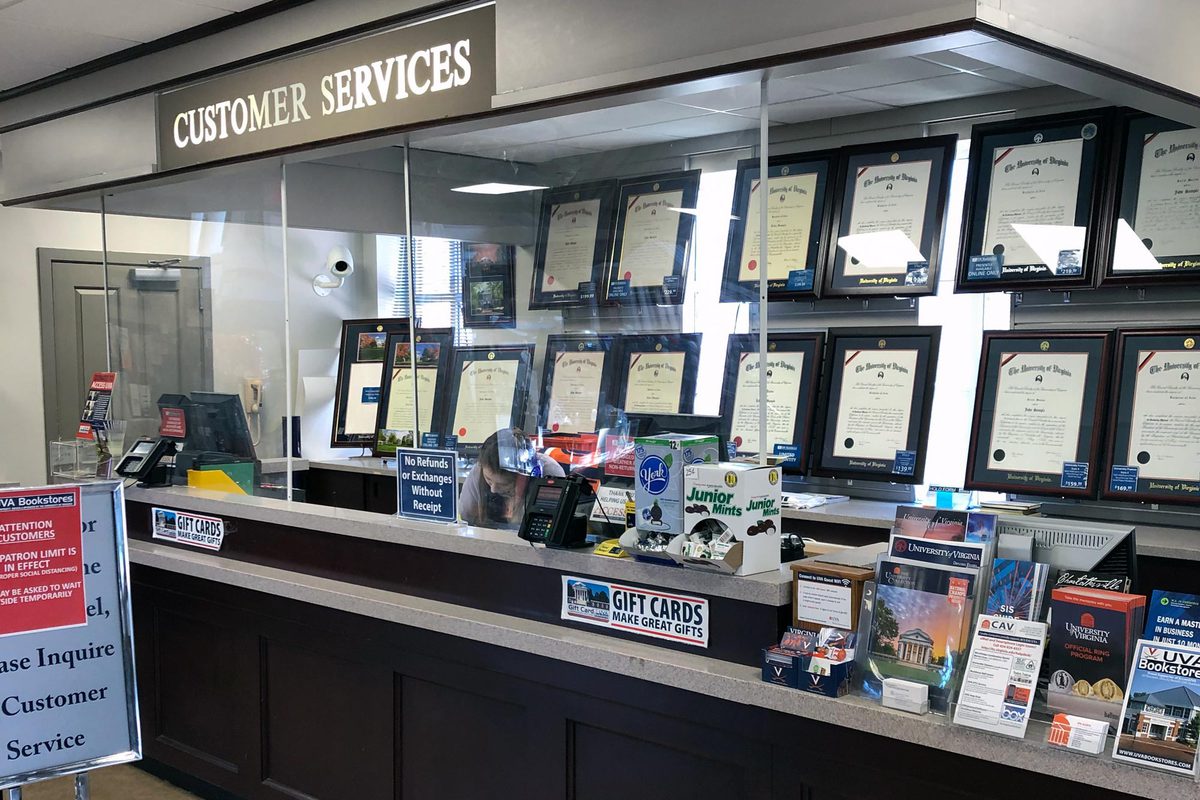
Plexiglass storm windows from Alderman Library were refurbished to make protective shields for the University Bookstore. (Photo by Shawn Ragland, Facilities Management)
Another useful item from Alderman Library was repurposed for the University Bookstore, which is open with modifications. When the bookstore management asked Facilities Management’s Newcomb Zone maintenance team if they would be able to provide some kind of protective shield for the cash registers, Customer Service desk and in the Cavalier Computers store, Shawn Ragland, HVAC supervisor, had an idea. With Alderman under renovation, there were plexiglass storm windows that were just going to be discarded. Ragland refurbished them into protective shields that form a barrier between clerks and customers.
Scholars’ Lab Active in Work to Fight COVID-19
The Scholars’ Lab is UVA Library’s community space for “the practice of experimental scholarship in all fields, informed by digital humanities, spatial technologies, and culture heritage thinking,” its website says. One part of that is its “makerspace,” where users can tinker with desktop fabrication, wearable technologies, physical computing and augmented reality.
But the lab’s recent efforts have turned much more serious.
“UVA and local community individuals have been reaching out to Scholars’ Lab about applying our makerspace equipment and skills to medical relief efforts,” Makerspace manager and lead research technologist Ammon Shepherd said. “In addition to hooking local volunteers into UVA’s COVID-19 relief network, our staff have been busy helping medical staff prototype and 3-D print supplies, sourcing materials and assembling these into medical equipment, and testing models for health safety.”
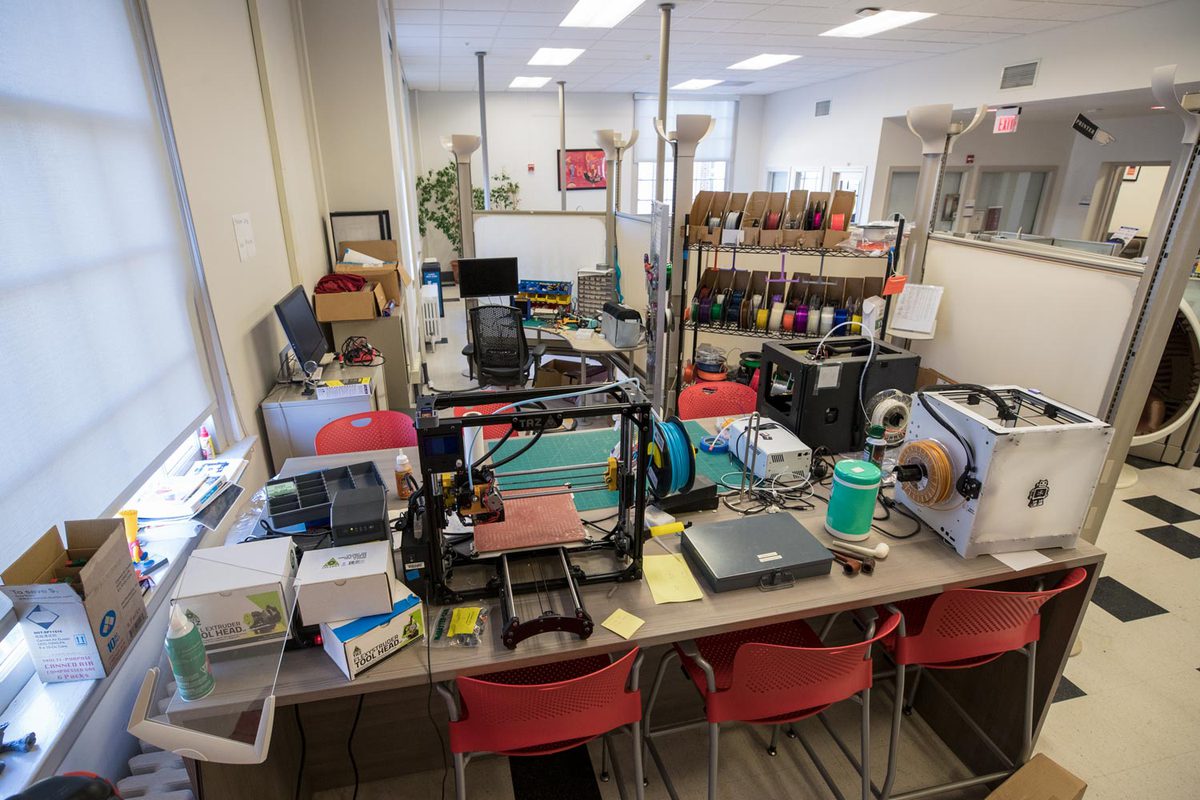
The Scholars’ Lab, located in Alderman Library, has helped with 3-D printing protective equipment and GIS mapping. (Photo by Dan Addison, University Communications)
Shepherd worked with the hospital’s telemedicine department to 3-D print web conference camera stands to allow doctors to check in on patients without entering rooms.
He is also remotely mentoring UVA students Nora Dale and Coke Matthews as Makerspace technologists working on different kinds of protective masks.
Managing director Amanda Visconti and senior developer Shane Lin are part of the “Maker Grounds” community initiative working on 3-D printing of protective masks and construction of facial shields.
Will Rourk, a 3-D data and content specialist, is “researching 3-D printing filaments for breathing, sterility and other facets of medical safety,” Visconti said. He has also been “exploring software to optimize 3-D printing output and repurposing 3-D scanners for potential reverse engineering medical equipment.” Rourk has also connected the needs of the Fluvanna EMT community and medical teachers at a local community college and hospitals to volunteers in UVA’s initiative on printing ventilator filters.
Special Collections Library Started a New Transcription Project
Although it’s possible to search the holdings of the Albert and Shirley Small Special Collections Library in Virgo and view many collections that have been digitized, those items are rarely transcribed. For example, a user can look up and view digitized handwritten letters or financial records, but those images rarely contain searchable text. Holly Robertson, exhibitions coordinator and registrar for the Special Collections Library, has started a crowdsourced transcription project to make that possible.
“Transcription of our unique primary sources makes our collections more accessible to all – from researchers looking for specific information to those who use screen readers or other assistive technology,” Robertson said. “Transcription is also something anyone can do during this time when we’re all home, yet looking for ways to connect with others and with meaningful work,” she added.
The project currently features opportunities to transcribe important pieces of UVA history as well as materials that document the lives of enslaved people and African American communities in Central Virginia.
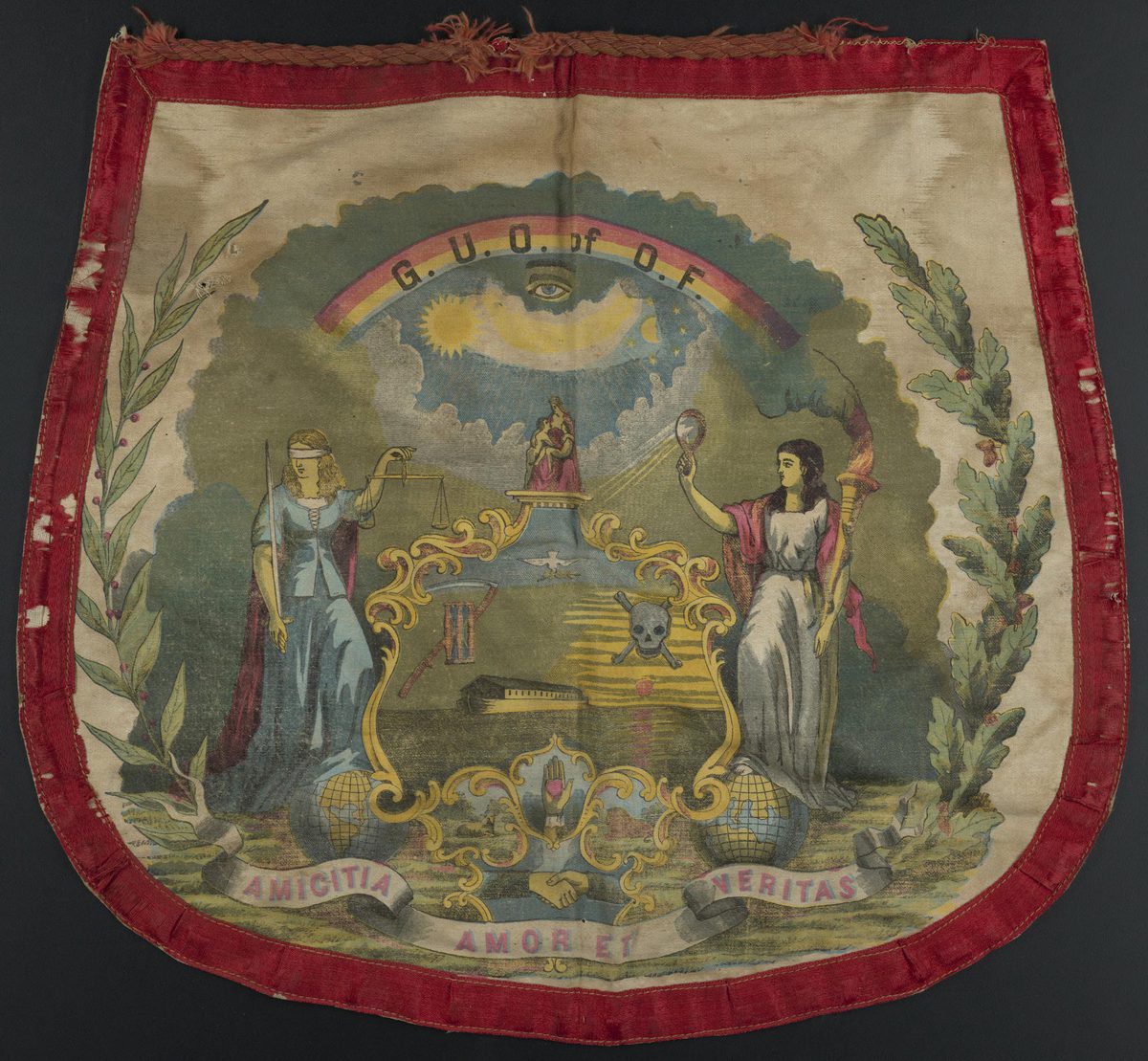
The Small Special Collections Library began a transcription project of several collections, including this item from the Madison Friendship Lodge No. 2121 Grand United Order of Odd Fellows. (Photo courtesy of Small Special Collections Library)
About 55 student workers are continuing their jobs by working remotely on the crowdsourced transcription project, but there is enough material that volunteers are welcome to participate, Robertson said. [Go to the library’s “From the Page” site to learn more about joining the transcription effort.]
The “Matriculation Books” of UVA students are among the items in the transcription project. The first volume, which covers the years 1825 to 1855, lists each student, new and returning, who was officially registered at the University.
“Transcription of the works we’ve posted will help researchers search these rich texts for names, place, and background on often-underrepresented lives,” Robertson said. The Watson Family Papers notebook, Carter Family letterbook and Madison Friendship Lodge registry books are all good examples of this, she said.
“Using a modern, reparative lens, we are focusing our work across the library to help researchers surface stories not yet told,” Robertson said.
Among the papers of the Watson family of Louisa County is a “slave notebook” in which Thomas Watson recorded work performed by individual enslaved laborers, both men and women, as well as payments they received as a “reward” or for extra work. Transcription will transform this handwritten accounting ledger into a virtual treasure trove of names and life events for African American genealogists whose ancestors were enslaved by this family.
Of the five collections in the project thus far, 598 out of 1,260 pages had been transcribed as of April 15. Robertson said as work is completed, more collections will be added, such as the second volume of the University’s Matriculation Books that covers the Civil War years.
Robertson said she and others are still working on upcoming exhibits, even if they end up being virtual.
Even through these unusual adjustments due to the coronavirus, the library will stay true to its mission – providing services and resources to ensure that the University community has the information it needs for teaching and research.
Media Contact
Article Information
April 21, 2020
/content/behind-scenes-uva-library-staff-aid-courses-research-donations

